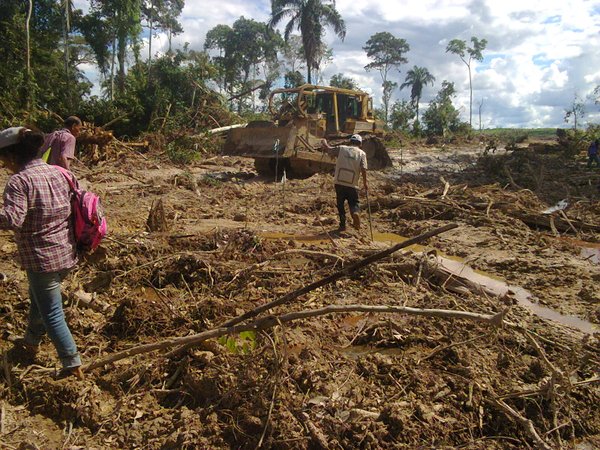On the 25th April the complaints panel of the RSPO (Round table on Sustainable Palm Oil) issued a preliminary “Stop work order” to Plantaciones de Pucallpa, one of its Peruvian members, whose operations are affecting the territory of the Shipibo community of Santa Clara de Uchunya in the Ucayali region of the Peruvian Amazon.

The order was issued after the community of Santa Clara de Uchunya filed a formal complaint in December 2015 against Plantaciones de Pucallpa for the destruction of over 5,000 hectares of their ancestral forest lands. The complaint cites the devastating impacts on the rivers and forest ecology on which their subsistence livelihood depends, the destruction of community dwellings and the restrictions on community members who wish to access the forest.
The complaints panel focused on five key areas where RSPO principles may have been contravened. These include the failure to respect customary land rights which it notes is a legal obligation in Peru and under international law, the clearance of primary forest that is strictly prohibited by both Peruvian law and RSPO procedures, and deforestation without any of the permits required by Peruvian law.
Furthermore, the complaints panel also highlighted that Plantaciones de Pucallpa has clearly violated its New Planting Procedure (NPP) which requires notification prior to the development of new plantations. The NPP’s also require that companies conduct assessments of Environmental Impact and High Conservation Value (HCV) areas as well as initiate FPIC processes with affected communities. The complaint makes very clear that no attempt was made by Plantaciones de Pucallpa to secure the Free, Prior and Informed Consent (FPIC) of Santa Clara de Uchunya.
The complaints panel also issued a reminder to Plantaciones de Pucallpa that the intimidation of communities is strictly prohibited. This final point is welcome given that community leaders are facing multiple and unfounded legal denunciations by Plantaciones de Pucallpa. Meanwhile, other local activists have been issued with anonymous death threats in recent months for their outspoken opposition to the operations.
The complaints panel gave Plantaciones de Pucallpa a 14-day time frame in which to demonstrate that it has complied with these obligations including:
- Demonstrate that it has satisfied all legal requirements in the acquisition, clearance and planting of the concession area, and
- Demonstrate that in establishing the plantation it has not cleared any primary forest or any other HCV area…In the meantime, the Panel prohibits Plantaciones from carrying out any further land clearance and planting activities pending the resolution of this complaint.
Just a few days earlier, in a further letter to the RSPO, the community authorities of Santa Clara had reiterated the substance of their complaint and explained: “Since we filed the complaint, the company Plantaciones de Pucallpa SAC continue to occupy the area in question which is now encircled by a barbed wire fence and watched over by a control post thereby preventing the entry of our community members in our territory. …In addition, our own authorities and community members are being legally denounced by the operators of this company for simply opposing the deforestation and defending our territory. In no way will we renounce our rights to life and territory.”
Community leaders were in the field conducting patrols of their territory when the decision was released by the RSPO. Mr Robert Guimaraes, President of FECONAU, said: “We welcome this initial decision of the RSPO but we will be vigilant to ensure that the RSPO conducts adequate follow up. Only in September last year the Ministry of Agriculture also ordered the suspension of operations in yet the company continues to operate. It is also clear to us that the Peruvian state has failed to comply with its international human rights obligations.
“Not only has it failed to title and secure these lands but it has continued in corrupt fashion to sell and hand over community lands to third parties. It is this defective land allocation system that is generating these conflicts, not only in Santa Clara but throughout the Peruvian Amazon where there are more than 1200 communities whose lands remain untitled. We are demanding that the Peruvian state meet this obligation and title the community’s territory of over 38,000 hectares.”
Dr Tom Griffiths, Coordinator of FPP’s Responsible Finance Programme, welcomed the decision by the Complaints panel but highlighted: “It is vital that the ruling of the RSPO complaints panel is fully complied with by the company and properly monitored. Crucially, there must be sustained follow up by the RSPO to ensure effective sanction for company violations. Voluntary certification schemes have a role to play, but there needs to be much more robust regulatory control of palm oil supply chains at the local, national and global levels. In the case of Peru, without effective state regulation, law enforcement and reform of unjust land allocation systems in the Amazon, Peru’s ambitious commitments to protect forests and secure indigenous land rights are likely to fail.”
